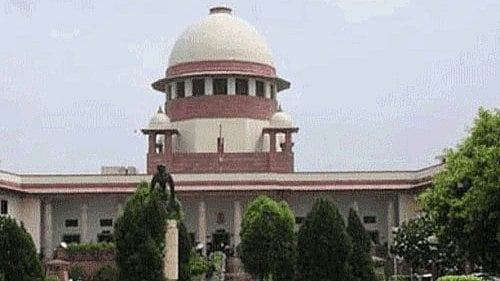
The Supreme Court bench found no mention about any involvement of the appellants in the suicidal death of the deceased, or about the incident which had allegedly put the deceased in a state of depression.
PTI File Photo
New Delhi: The Supreme Court has discharged a man and his parents in a case of abetment to suicide of his wife in 2015, after finding sufficient gap in the incident and the alleged act of instigation.
A bench of Justices B R Gavai and K V Vishwanathan said in order to link the act of instigation to the suicide, the two occurrences must be in close proximity to each other so as to form a nexus or a chain, to make it a direct result of the act by the accused person.
"The cardinal principle of the subject matter at hand is that there must be a close proximity between the positive act of instigation by the accused person and the commission of suicide by the victim. The close proximity should be such as to create a clear nexus between the act of instigation and the act of suicide," the bench said in its judgment on December 20, 2024.
As per facts, the couple got married on November 19, 2009. Thereafter, disputes arose and the parties started residing separately. The deceased started residing at her paternal house from August 8, 2013. A mahalokadalat was held at the court in Sangamner on February 17, 2015 during which the appellants allegedly refused to cohabitate with the woman or accept her or her child at her matrimonial house or settle the proceedings initiated by the woman. On March 20, 2015, she ended her life by suicide.
The appellants claimed the date of mahalokadalat had been mentioned incorrectly as it took place an year before.
"Even if we take the date of the mahalokadalat to be February 17, 2015 to be the factually correct one, there is enough gap between the two incidents to render the instigation or incitement by the appellants, nugatory," the bench said.
The court noted there is a clear gap of over a month between the incident at the mahalokadalat and the commission of suicide.
"We therefore find that the courts below have erroneously accepted the prosecution story that the act of suicide by the deceased was a direct result of the words uttered by the appellants at the mahalokadalat," the bench said.
The court allowed the appeal against the Bombay High Court's October 17, 2022 judgement which dismissed their plea against rejection of discharge plea by the trial court of Ahmednagar on December 24, 2020.
Also referring to accidental death report, the bench found no mention about any involvement of the appellants in the suicidal death of the deceased, or about the incident that had occurred at the mahalokadalat which had put the deceased in a state of depression such that she frequently spoke about committing suicide.
Instead, the court noted, these facts are alleged for the first time in the FIR, lodged five days after.
"No doubt that a young woman of 25 years has lost her life in an unfortunate incident. However, in the absence of sufficient material to show that the appellants had intended by their words to push the deceased into such a position that she was left with no other option but to commit suicide, continuation of criminal proceedings against the appellants would result in an abuse of process of law," the bench said.
